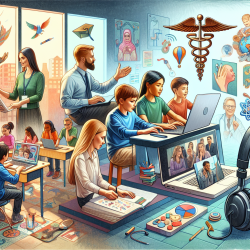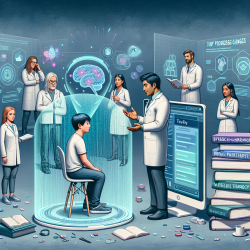In recent years, the increasing demands on educators and school-based therapists have led to widespread burnout. As government health regulators, it is crucial to explore innovative solutions that not only address these challenges but also enhance the quality of special education services provided to students. One such solution is the implementation of online therapy services, such as those offered by TinyEYE.
Burnout among school staff, particularly those involved in special education, has become a pressing issue. According to a recent study, nearly 60% of special education teachers reported feeling burnt out, with many considering leaving the profession altogether. This alarming trend necessitates immediate intervention and support.
The Role of Online Therapy in Alleviating Burnout
Online therapy services can play a pivotal role in reducing burnout among school staff. Here’s how:
- Flexibility and Accessibility: Online therapy provides flexibility in scheduling sessions, allowing therapists to manage their workload more effectively. This reduces the stress associated with rigid schedules and long commutes.
- Resource Optimization: Schools often face challenges in speech therapy staffing. Online therapy platforms like TinyEYE offer a vast network of qualified therapists, ensuring that schools can access the expertise they need without geographical limitations.
- Enhanced Support: Online platforms facilitate better communication and collaboration between therapists, educators, and parents. This integrated approach ensures that students receive comprehensive support, thereby reducing the burden on individual staff members.
Benefits for Students and Schools
Beyond alleviating staff burnout, online therapy services offer numerous benefits for students and schools:
- Personalized Learning: Online therapy allows for tailored interventions that cater to the unique needs of each student. This personalized approach enhances the effectiveness of special education programs.
- Consistency and Continuity: Online therapy ensures that students receive consistent support, regardless of staff changes or absences. This continuity is vital for the progress and well-being of students in special education.
- Cost-Effective: Implementing online therapy can be more cost-effective than traditional in-person services. Schools can allocate resources more efficiently, ultimately benefiting the entire educational ecosystem.
Next Steps for Government Health Regulators
As government health regulators, your role in shaping the future of special education is paramount. Here are actionable steps to consider:
- Advocate for Funding: Secure funding for schools to implement online therapy services. This investment will yield long-term benefits by improving staff well-being and student outcomes.
- Policy Development: Develop policies that support the integration of online therapy into school systems. Ensure that these policies address the unique needs of special education and provide clear guidelines for implementation.
- Stakeholder Collaboration: Foster collaboration between schools, therapy providers, and policymakers. This collaborative approach will ensure that online therapy services are effectively integrated and supported.
By taking these steps, government health regulators can play a crucial role in addressing burnout among school staff and enhancing the quality of special education services. TinyEYE’s online therapy platform offers a viable solution that aligns with these goals, providing the flexibility, support, and resources needed to create a more sustainable and effective educational environment.
In conclusion, the growing knowledge and evidence supporting online therapy services highlight their potential to transform special education. It is time for government health regulators to take the next step and champion the integration of these innovative solutions into our schools.










